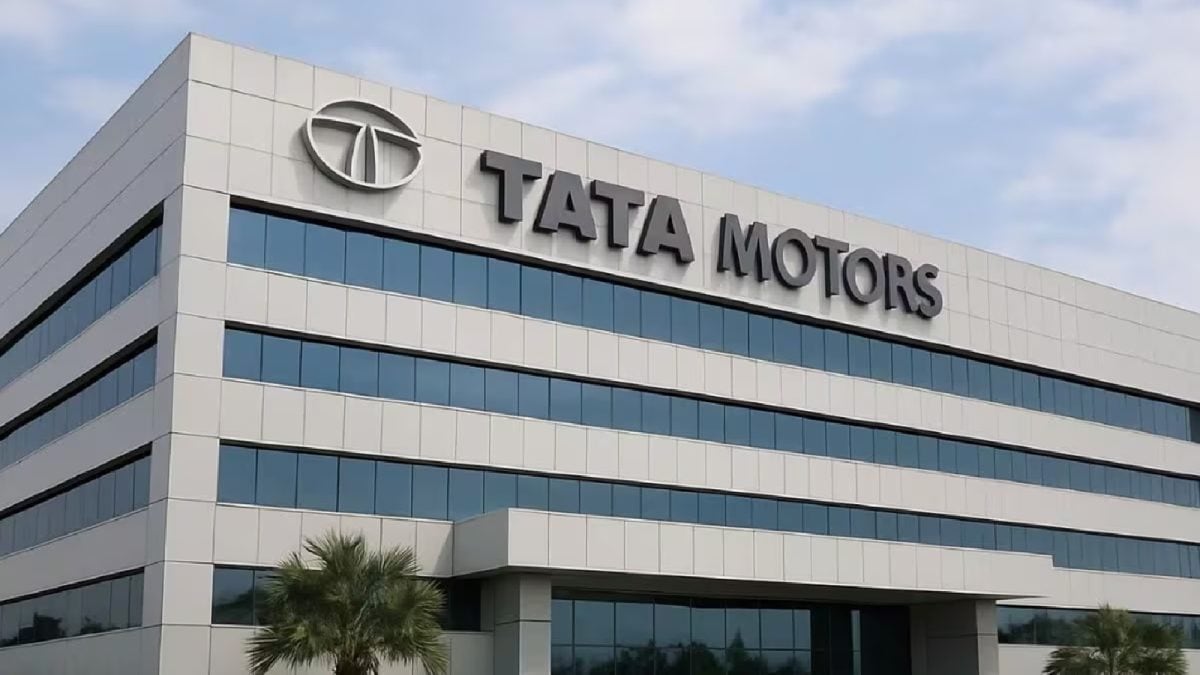Politics
Trump signals possible return to nuclear testing, weighs F-35 deal with Saudis
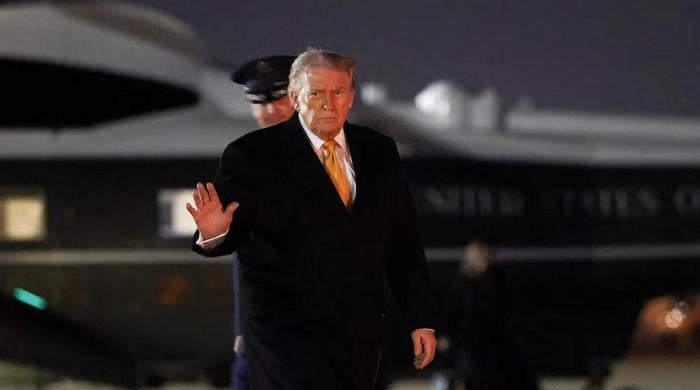
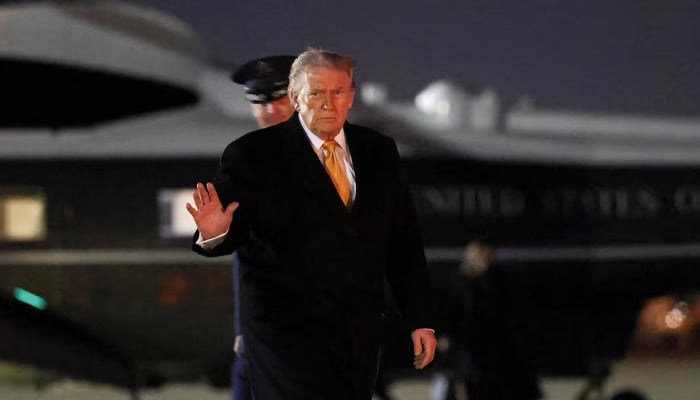
- Trump last month ordered resumption of nuclear weapons testing.
- Says Saudi Ariabia want to buy lot of jets and he is looking into it.
- Trump lawyers threatened to sue the BBC for damages of up to $1bn.
The United States will resume nuclear testing in line with other nations, President Donald Trump said on Friday, while also confirming he is weighing a potential agreement to supply Saudi Arabia with F-35 fighter jets.
He did not clarify whether the testing plans involve detonating a nuclear warhead.
“I don’t want to tell you about that, but we will do nuclear testing like other countries,” Trump told reporters aboard Air Force One as he travelled to Florida for the weekend.
Trump last month ordered the US military to immediately restart the process for testing nuclear weapons after 33 years, making the surprise announcement on Truth Social while aboard his Marine One helicopter flying to meet Chinese President Xi Jinping for a trade-negotiating session in Busan, South Korea.
F-35s deal with Saudi Arabia in the offing
Trump also said on Friday that he is considering agreeing to a deal to supply Saudi Arabia with F-35 stealth fighter jets, which are made by Lockheed Martin.
“They wanna buy a lot of jets,” Trump told reporters.
“I’m looking at that. They’ve asked me to look at it. They want to buy a lot of ’35’ – but they want to buy actually more than that, fighter jets.”
The potential sale comes as Trump plans to host Saudi Crown Prince Mohammed bin Salman at the White House next week, when they are expected to sign economic and defence agreements.
Asked about the talks, Trump told reporters it was “more than a meeting, we’re honouring” Saudi Arabia.
Meanwhile, President Trump is expected to reach a deal with Saudi Crown Prince Mohammed bin Salman, allowing Riyadh to acquire F-35 stealth fighter jets, Bloomberg News reported on Friday, citing a White House official.
Trump and the crown prince plan to sign economic and defence agreements during a visit to the White House scheduled for Tuesday, the report added.
Reuters could not immediately verify the report.
A Pentagon intelligence report has raised concerns over the potential F-35 deal, warning that China could acquire the aircraft’s technology if the sale proceeds, the New York Times reported on Thursday, citing people familiar with the assessment.
Legal action against BBC
President Donald Trump on Friday told reporters he will take legal action against the British Broadcasting Corporation next week.
The BBC sent a personal apology to President Trump on Thursday but said there was no legal basis for him to sue the public broadcaster over a documentary his lawyers called defamatory.
The documentary, which aired on the BBC’s “Panorama” news programme just before the US presidential election in 2024, spliced together three parts of Trump’s speech on January 6, 2021, when his supporters stormed the Capitol. The edit created the impression he had called for violence.
“While the BBC sincerely regrets the manner in which the video clip was edited, we strongly disagree that there is a basis for a defamation claim,” the broadcaster said in a statement.
Lawyers for the US president threatened on Sunday to sue the BBC for damages of up to $1 billion unless it withdrew the documentary, apologised to the president and compensated him for “financial and reputational harm.”
Politics
China warns Japan of ‘crushing’ defeat, tells Chinese citizens to shun visits
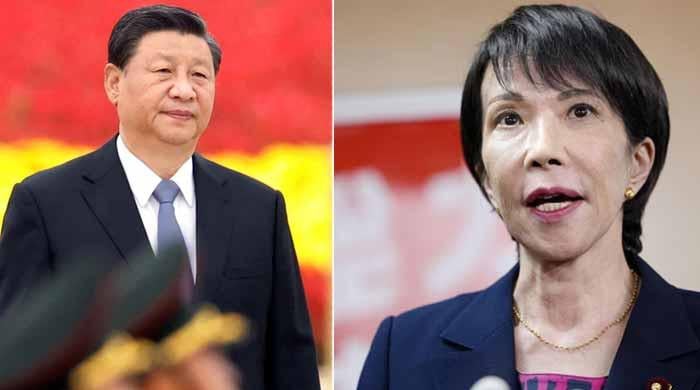
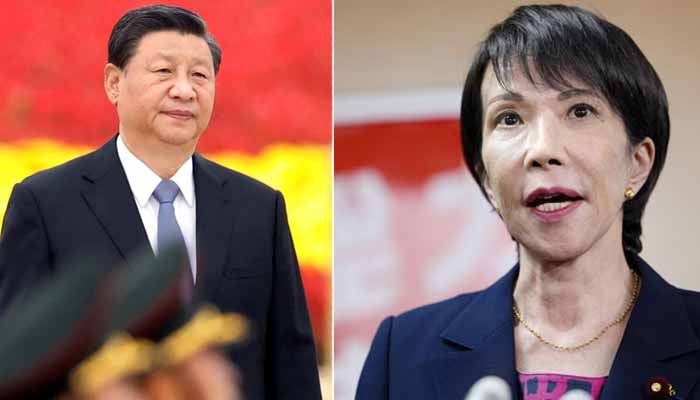
- China angered by Japanese prime minister’s Taiwan comments.
- Japan summons Chinese ambassador for diplomat’s comment.
- Wartime history source of continuing China-Japan tension.
China has warned Japan of a “crushing” military defeat if it uses force to intervene over Taiwan, and even cautioned Chinese citizens against visits to Japan, angered by its prime minister’s remarks about the island, which Beijing claims.
Tokyo on Friday summoned Beijing’s ambassador to Japan to protest against a top Chinese diplomat’s online post about Prime Minister Sanae Takaichi, continuing a tit-for-tat spat that has run for a week.
Takaichi sparked a diplomatic row with Beijing with comments in parliament last week that a Chinese attack on Taiwan could amount to a “survival-threatening situation” and trigger a military response from Tokyo.
Last Saturday, China’s Consul General in Osaka, Xue Jian, shared a news article about Takaichi’s remarks about Taiwan on X and commented, “the dirty neck that sticks itself in must be cut off” in a now-deleted post.
The Japanese foreign ministry retaliated by summoning the Chinese ambassador to Japan for what it called “extremely inappropriate” statements made by Xue.
Some senior Japanese political figures have called for Xue’s expulsion, but Tokyo has so far only asked Beijing to “take appropriate measures” without elaborating.
Chinese Defence Ministry spokesperson Jiang Bin said that Takaichi’s words were extremely irresponsible and dangerous.
“Should the Japanese side fail to draw lessons from history and dare to take a risk, or even use force to interfere in the Taiwan question, it will only suffer a crushing defeat against the steel-willed People’s Liberation Army and pay a heavy price,” Jiang said in a statement.
On Thursday, the Chinese foreign ministry summoned Japan’s ambassador to China to lodge a “strong protest” over Takaichi’s remarks.
It was the first time in more than two years that Beijing has called in a Japanese ambassador. It last summoned the then-ambassador in August 2023 over Japan’s decision to release wastewater from the Fukushima Daiichi nuclear power plant into the sea.
The ministry on Friday also expressed “serious concerns” about Japan’s recent military and security moves, including ambiguity over its non-nuclear principles.
Ministry spokesperson Lin Jian said at a press conference that Japan’s decision not to rule out acquiring nuclear submarines indicates a major “negative” policy shift.
Late on Friday, the ministry asked Chinese citizens to avoid travelling to Japan in the near future, citing deteriorating ties over Takaichi’s remarks and the “significant risks” its nationals would face there.
Lingering grievances
Chinese state media has weighed in with a series of vitriolic editorials and commentaries lambasting Takaichi, given lingering grievances about Japan’s wartime past and China’s extreme sensitivity over anything Taiwan-related, just two weeks after Chinese leader Xi Jinping met Takaichi in South Korea.
Takaichi’s remarks were by no means an “isolated political rant,” the Communist Party’s People’s Daily said earlier on Friday in a commentary.
Japan’s right wing has been trying to loosen some of the constraints of the country’s post-World War Two constitution and pursue the status of a military power, said the commentary published under the pen name “Zhong Sheng”, meaning “Voice of China” and often used to give views on foreign policy.
“In recent years, Japan has been racing headlong down the path of military buildup,” the paper added.
“From frequent visits to the Yasukuni Shrine, to denying the Nanjing Massacre, to vigorously hyping the ‘China threat theory,’ Takaichi’s every step follows the old footprints of historical guilt, attempting to whitewash a history of aggression and revive militarism.”
World War Two and the Japanese invasion of China, which preceded it in 1931, remain a source of ongoing tension between Beijing and Tokyo.
Beijing claims democratically governed Taiwan as its own and has not ruled out using force to take control of the island.
Taiwan sits just over 110km from Japanese territory and the waters around the island provide a vital sea route for trade that Tokyo depends on. Japan also hosts the largest contingent of the US military overseas.
Japanese broadcaster NTV reported on Friday the Chinese embassy in Tokyo had instructed its staff to avoid going out due to concerns about rising anti-China sentiment.
In a regular news conference, Japan’s top government spokesperson Minoru Kihara reiterated the country’s position on Taiwan, telling reporters that Tokyo hopes for a peaceful resolution of the issue through dialogue.
‘Self-directed farce’
On Friday, the State Council’s Taiwan Affairs Office criticised Taiwan’s ruling Democratic Progressive Party (DPP) lawmaker Puma Shen, who visited Berlin earlier this week. Shen claimed China was threatening to try to get him arrested while abroad, but that he was not frightened.
“Taiwan independence advocates are already at the dusk of their days and at a dead end,” the office’s spokesperson Chen Binhua said, according to state broadcaster CCTV.
A day earlier, Chinese police issued a wanted notice and offered a $35,000 reward for two Taiwanese social media influencers they accused of “separatism”.
The two influencers took to social media to poke fun at the wanted notice.
One of them, the rapper Mannam PYC, posted a video on Friday where he tried to turn himself in to the police in Taiwan.
Politics
Explosion rips through police station in Srinagar, official says
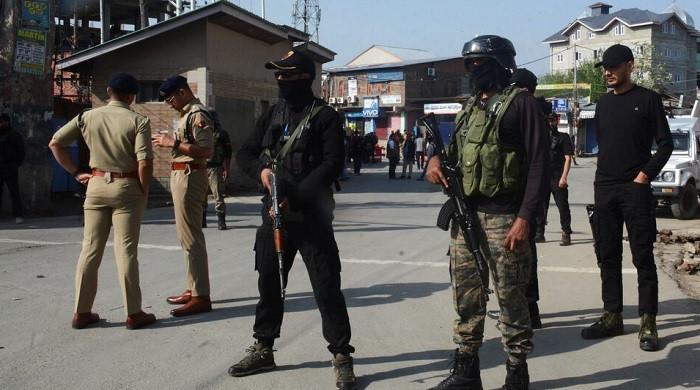
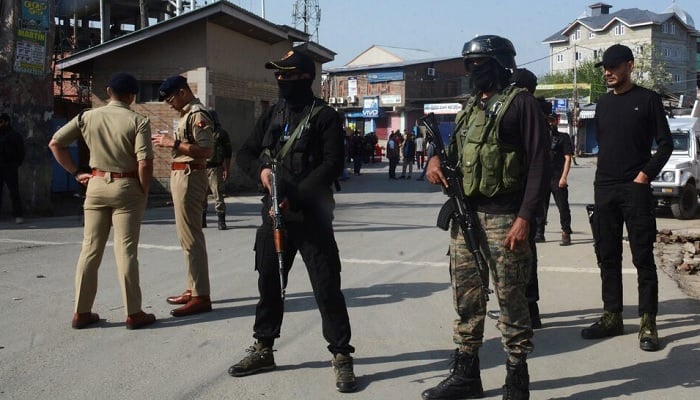
An explosion ripped through a police station in Srinagar city in the Indian Illegally Occupied Jammu and Kashmir (IIOJK) region late on Friday, a local police official said.
A fire engulfed the Nowgam police station compound, and fire tenders have been rushed to the spot, the official said, adding that casualties were feared.
Indian media also reported a blast at the police station, with visuals of a raging fire.
The cause of the explosion was not immediately clear. It comes four days after a deadly car explosion in Delhi, India’s capital, that the government said was a terror incident.
This is a developing story and is being updated with additional information.
Politics
Hundreds in Tehran pray for rain as Iran battles drought
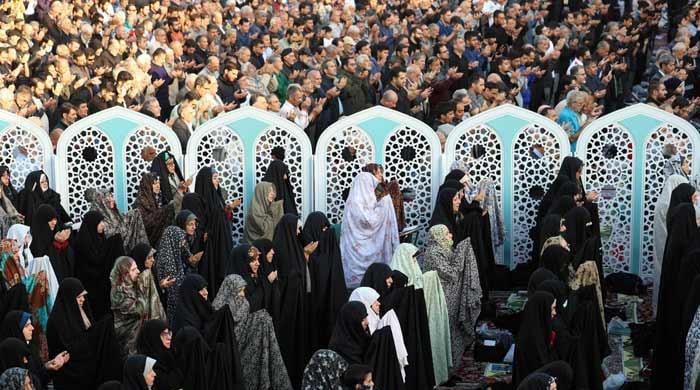
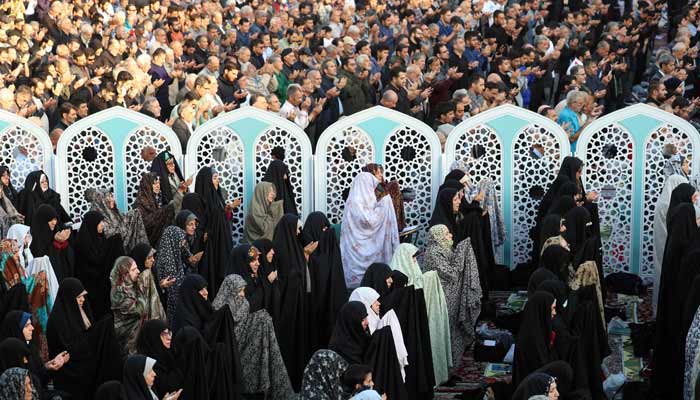
Hundreds of people gathered on Friday at a mosque in northern Tehran to pray for rain, with Iran gripped by one of its worst droughts in decades.
Rainfall in the capital has this year been at its lowest level in a century, local officials say, and half of Iran’s provinces have not seen a drop in months.
Faced with water shortages, the government has decided to cut off water supplies periodically to Tehran’s 10-million-strong population to limit consumption.
On Friday, men and women gathered at the Emamzadeh Saleh mosque in the Iranian capital and said a special prayer to implore God for rain.
Tehran nestles on the southern slopes of the Alborz mountains and has hot, dry summers usually relieved by autumn rains and winter snowfall.
The mountain peaks, usually already covered in snow at this time of year, are still dry.
Tehran is by far the country’s biggest city and its inhabitants use three million cubic metres of water per day, according to local media.
Last week, President Masoud Pezeshkian cautioned that without rainfall before winter, Tehran could face evacuation, though he did not elaborate.
The government later explained that Pezeshkian had only wanted to alert residents that the situation was serious and was not presenting a concrete plan.
Of the five major dams supplying drinking water in the capital, one is empty and another is at less than 8% of capacity, officials say.
The situation in the rest of the country is hardly any better. Local media reported that Iran’s precipitation level this year has reached just 152 millimetres, a 40% decline compared to the 57-year average.
-

 Entertainment7 days ago
Entertainment7 days agoChina unveils£5.4 bn Fujian, its most advanced aircraft carrier yet
-
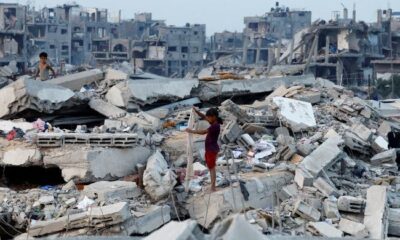
 Politics7 days ago
Politics7 days agoIDF lawyers warned of possible Gaza war crimes: US intel findings
-

 Entertainment1 week ago
Entertainment1 week agoRobert Pattinson jokes about competing with Gen Z
-

 Tech1 week ago
Tech1 week ago‘Vibe coding’ named word of the year by Collins dictionary
-

 Business1 week ago
Business1 week agoFM asks banks to ensure staff speak local language – The Times of India
-

 Sports1 week ago
Sports1 week agoWho’s the striker beating Mbappé, Haaland in race for European Golden Shoe?
-
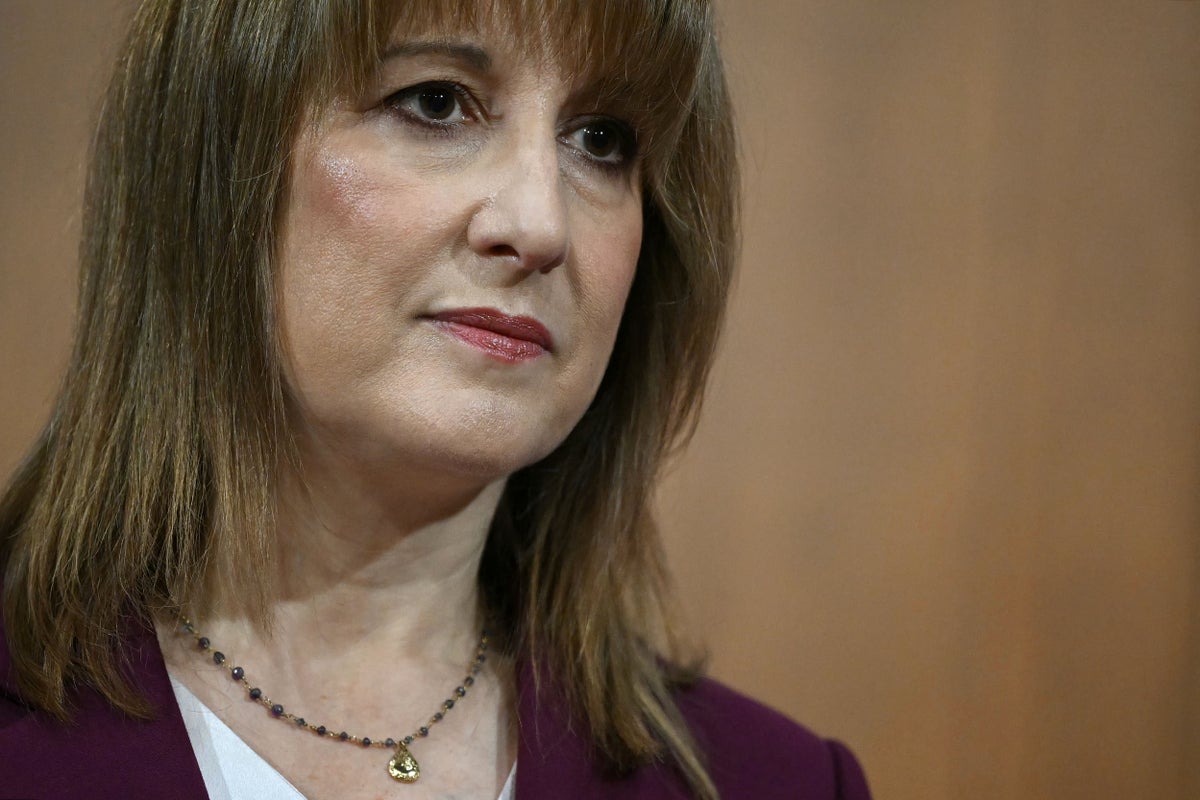
 Business1 week ago
Business1 week agoBudget tax hikes could see food prices soar, major supermarket boss warns
-
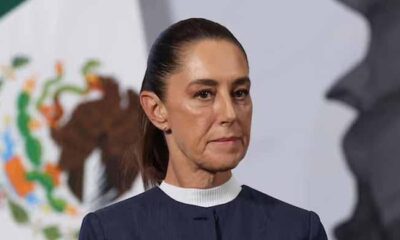
 Politics1 week ago
Politics1 week agoGroping of Mexico’s president puts violence against women in spotlight



